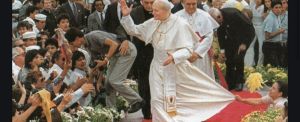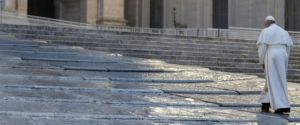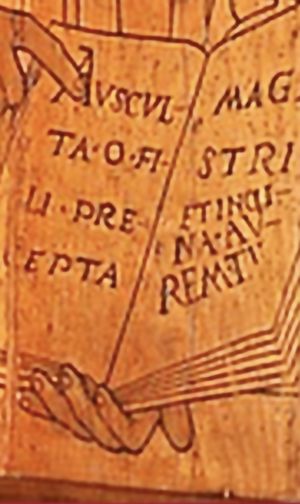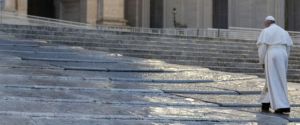
don Giuseppe Nespeca
Giuseppe Nespeca è architetto e sacerdote. Cultore della Sacra scrittura è autore della raccolta "Due Fuochi due Vie - Religione e Fede, Vangeli e Tao"; coautore del libro "Dialogo e Solstizio".
From the Core to the terraces: Mystery of Uniqueness
Important Uniqueness does not let us “resume”: but it makes us Rebirth
(Mt 10:24-33)
Christ’s proposal subverts quietism and the sense of personal and social life, so his friends find themselves counter-hand.
The disciple of Truth is exposed to attacks.
There is no set orientation. But in states of discomfort, in defeat, in humiliation, a malleable energy world acts, which brings innate capacities to the surface; it activates the person to fly with its own wings.
It is a point of origin, which wherever we go we do not shake off. Because here we are ourselves; in the centre of our Mission, not homologated under conventions and accommodations.
As such, belonging to the Church is not a safe haven and shelter from every storm.
The faithful should not be astounded by the trials, sufferings, isolation, blackmail - ploys of those who use power [or established religiosity itself] for their own gain and as a weapon.
The fear of being marginalized cannot push us to hide the truth, which is a factor of recognition for us: to lose the connection and neglect to be one with it would be worse than torture.
To be honest, what makes us cowards, unfaithful, diplomatic and weak - therefore useless and irrelevant - is often much much less than a danger to life, to goods, or to our smallest freedoms.
Purposes that are too close do not unite man and the world to God. They do not confirm the rightness and conformity of the great End and Source: continuous Presence that accompanies our particular activity.
There are many «falling hairs», but each of them has an original appearance: it “is” in a special way, it has its own place and meaning.
The personal Call remains constitutive of the unrepeatable essence that opens the door to the commitment of Uniqueness.
It opens up the task of 'rebirth', in the exceptional awe of the new genesis of each person, and of the earth.
It is unprecedented essence. Grammar of our language, character of interacting in the world, and of listening to God.
The genuine Vocation - unrepeatable to the end, whatever the cost - is the only path to take to read and meet the 'genius of the age' before the problems.
Personal Atypicality fertilised by Mystery is a kind of impulse that turns crises into opportunities. Willingness-factor of recognition that accompanies and orients us in them; with the help of simplicity, for a new blossoming.
Here, even in seemingly insignificant or downright critical situations, we can perceive the energy of inner resources - left free to act and nurture all opposing situations.
By walking the paths of the unusual, we will become flexible; we will ride the waves of unexpected change.
But right there we will be totally ourselves: cosmic and divine intention, immeasurably important ones.
To internalize and live the message:
Did a persecution happen to you that - while you would have preferred other near goals - brought out the very originality of your vocational physiognomy?
[Saturday 14th wk. in O.T. July 12, 2025]
Uniqueness
11. “Each in his or her own way” the Council says. We should not grow discouraged before examples of holiness that appear unattainable. There are some testimonies that may prove helpful and inspiring, but that we are not meant to copy, for that could even lead us astray from the one specific path that the Lord has in mind for us. The important thing is that each believer discern his or her own path, that they bring out the very best of themselves, the most personal gifts that God has placed in their hearts (cf. 1 Cor 12:7), rather than hopelessly trying to imitate something not meant for them. We are all called to be witnesses, but there are many actual ways of bearing witness. Indeed, when the great mystic, Saint John of the Cross, wrote his Spiritual Canticle, he preferred to avoid hard and fast rules for all. He explained that his verses were composed so that everyone could benefit from them “in his or her own way”. For God’s life is communicated “to some in one way and to others in another”.
[Gaudete et Exsultate]
Persecution and inappearance: from one's Core to the terraces
The Mystery of Oneness: the all-important Uniqueness does not let us "resume": but it makes us be Reborn.
(Mt 10:24-33)
Christ's proposal subverts the quietism and meaning of personal and social life.
The disciple of the Truth is exposed to attack.
There is no set orientation. But in states of discomfort, in defeat, in humiliation, a malleable energy world acts, which brings out innate capacities; it activates the person to fly with his own wings.
It is a source of origin, which wherever we go, we do not shake off. Because here we are ourselves; in the centre of our Mission, not homologated under conventions and accommodations.
In this way, belonging to the Church is not a safe haven and shelter from every storm.
The faithful must not be astounded by the trials, sufferings, isolation, blackmail - ploys of those who use power [or established religiosity itself] for their own gain and as a weapon.
The fear of being marginalised cannot drive us to hide the truth, which is a factor of recognition for us: to lose the connection and neglect to be one with it would be worse than torture.
To be honest, what makes us cowardly, unfaithful, diplomatic and weak - therefore useless and irrelevant - is often much less of a danger to life, property, or our smallest freedoms.
Purposes that are too close do not unite man and the world with God. They do not confirm the rightness and conformity of the great End and Source: continuous Presence that accompanies our particular activity.
Many are the "falling hairs", but each of them has an original physiognomy: it "is" in a special way, it has its own place and meaning.
The personal Calling remains constitutive of the unrepeatable essence that opens to the commitment of Oneness.
It opens to the task of 'rebirth': in the time of the global crisis, not of 'recovery as before' - but of exceptional astonishment in the new genesis of each person, and of the earth.
It is unprecedented character, even with ourselves. Cipher of the grammar of our daily language, of interacting in the world.
And in the soul, of listening to God who reveals himself by triggering vital energies [complete because discordant]. With its unthinking healing processes, without formula.
The genuine Vocation - unrepeatable to the end, whatever the cost - is the only path to take to read and encounter the 'genius of time' before problems.
Personal Atypicality fertilised by Mystery is a kind of impulse that turns crises into opportunities.
Willingness-factor of recognition that accompanies and orients us in them; with the help of simplicity, for a new blossoming.
Here, even in seemingly insignificant or downright critical situations, we can perceive the energy of inner resources - left free to act and nurture all opposing situations.
By treading the paths of the unusual, we will become flexible; we will ride the waves of unexpected change.
But there we will be totally ourselves: cosmic and divine intention, immeasurably important.
The encyclical Fratelli Tutti rails against "a model of globalisation that consciously aims at one-dimensional uniformity and seeks to eliminate all differences and traditions in a superficial quest for unity. If globalisation claims to make everyone equal, as if it were a sphere, this globalisation destroys the distinctiveness of each person and each people. This false universalist dream ends up depriving the world of the variety of its colours, its beauty and ultimately its humanity. Because the future is not monochromatic, but, if we have the courage, it is possible to look at it in the variety and diversity of the contributions that each person can make. How much our human family needs to learn to live together in harmony and peace without us all being equal!" (n.100)
It is good to rejoice in the dissimilarities that inhabit us, in the variety of contributions and points of view that each one can communicate - important: also in the view of difficulties and ways of solving them.
The mature, integral man, in the diversification and variety of knowledge, in the dissimilarity of approaches and processes, in the versatility of channels of expression, is more complete.
Today, even in a culture strongly marked by communitarian anthropology, such as that of Africa, one realises perfectly well the value of what is personal and unprecedented - even in favour of ties:
"A day will come when you too will have to share your knowledge of things and men. You will bear singular witness to a unique event revealed to you alone, in a language as yet unseen. And you will tell your brothers the unspeakable wisdom of your heart' [Irénée Guilane Dioh].A similarly African oral tradition - ceremonial and personalistic - indeed reads:
"The outward initiation is the opening of the eyes, all the teaching that is given during the traditional ceremonies or periods of retreat that follow. But this teaching one must then live it, assimilate it, make it bear fruit, adding to it one's own personal observations, one's own understanding, one's own experience'.
The scene of the spontaneous examples that Jesus draws from nature is also an echo of the conciliatory life dreamt for us by the Father.
It introduces us to the Happiness that makes one aware of existing, in all personal reality.
In fact, the Gospel passage shows the value of genuine, silent, unremarkable things, which nevertheless inhabit us - they are not 'shadows'. And we perceive them without effort or cerebral commitment.
In the time of epochal choices, of the emergency that seems to checkmate us - but wants to make us less artificial - such awareness can overturn our judgement of substance, of 'the small' and 'the great'.
Indeed, for the adventure of love there is no accounting.
'Heaven' that conquers death is in God and in reality the 'place' for each of us without lacerations.
The afterlife is not imprecise.
One does not have to distort oneself for consensus... much less for a constellated firmament.
The destiny of exceptional Uniqueness does not go to ruin: it is precious and dear, as every singularity is in nature.
Its Beauty, future and already present, must be discerned.
With immediate gain marginalised, or any social guarantee that does not concern the value of littleness - there will be no more need to identify oneself with the skeletons of established [or fashionable] thought and manners.
Nor will it matter to place oneself above and in front: rather, in the background; already rich and perfect, in the intimate sense of fullness of being.
Thus we will not have to trample on each other (cf. Lk 12:1)... even to meet Jesus.
In short:
"We are absolutely lost if we lack this particular individuality, the only thing we can truly say is ours - and whose loss is also a loss for the whole world. It is also precious because it is not universal' [Rabindranath Tagore].
Indeed, even in a relationship of deep love and coexistence "there is a need to free oneself from the obligation to be equal" (Amoris Laetitia, no.139).
To internalise and live the message:
Did a persecution happen to you that - while you would have preferred other near goals - brought out precisely the uniqueness of your vocational physiognomy?
For Jesus we are not a "mass", a "multitude"! We are individual "persons" with an eternal value, both as creatures and as re-deemed persons! He knows us! He knows me, and loves me and gave himself for me! (Gal 2:20) [John Paul II]
Uniqueness
11. “Each in his or her own way” the Council says. We should not grow discouraged before examples of holiness that appear unattainable. There are some testimonies that may prove helpful and inspiring, but that we are not meant to copy, for that could even lead us astray from the one specific path that the Lord has in mind for us. The important thing is that each believer discern his or her own path, that they bring out the very best of themselves, the most personal gifts that God has placed in their hearts (cf. 1 Cor 12:7), rather than hopelessly trying to imitate something not meant for them. We are all called to be witnesses, but there are many actual ways of bearing witness. Indeed, when the great mystic, Saint John of the Cross, wrote his Spiritual Canticle, he preferred to avoid hard and fast rules for all. He explained that his verses were composed so that everyone could benefit from them “in his or her own way”. For God’s life is communicated “to some in one way and to others in another”.
[Gaudete et Exsultate]
Blood of martyrs, personal and divine
Tertullian's apologetic writings are above all the most famous. They manifest two key intentions: to refute the grave accusations that pagans directed against the new religion; and, more proactive and missionary, to proclaim the Gospel message in dialogue with the culture of the time.
His most famous work, Apologeticus, denounces the unjust behaviour of political authorities toward the Church; explains and defends the teachings and customs of Christians; spells out differences between the new religion and the main philosophical currents of the time; and manifests the triumph of the Spirit that counters its persecutors with the blood, suffering and patience of the martyrs: "Refined as it is", the African writes, "your cruelty serves no purpose. On the contrary, for our community, it is an invitation. We multiply every time one of us is mowed down. The blood of Christians is effective seed" (semen est sanguis christianorum!, Apologeticus, 50: 13).
Martyrdom, suffering for the truth, is in the end victorious and more efficient than the cruelty and violence of totalitarian regimes.
But Tertullian, as every good apologist, at the same time sensed the need to communicate the essence of Christianity positively. This is why he adopted the speculative method to illustrate the rational foundations of Christian dogma. He developed it in a systematic way, beginning with the description of "the God of the Christians": "He whom we adore", the Apologist wrote, "is the one, only God". And he continued, using antitheses and paradoxes characteristic of his language: "He is invisible, even if you see him, difficult to grasp, even if he is present through grace; inconceivable even if the human senses can perceive him, therefore, he is true and great!" (cf. ibid., 17: 1-2).
Furthermore, Tertullian takes an enormous step in the development of Trinitarian dogma. He has given us an appropriate way to express this great mystery in Latin by introducing the terms "one substance" and "three Persons". In a similar way, he also greatly developed the correct language to express the mystery of Christ, Son of God and true Man.
The Holy Spirit is also considered in the African's writings, demonstrating his personal and divine character.
[Pope Benedict, General Audience, 30 May 2007]
Theology of the body
1. Man created in the image of God is both a bodily and a spiritual being, that is to say, a being that, in one respect, is bound to the external world and in the other transcends it. As a spirit, as well as a body, he is a person. This truth about man is the object of our faith, as is the biblical truth about his constitution in the 'image and likeness' of God; and it is a truth that has been constantly presented by the Magisterium of the Church down the centuries.
The truth about man has never ceased to be the object of intellectual analysis throughout history, both in philosophy and in numerous other human sciences: in a word, the object of anthropology.
2. That man is spirit incarnate, if you like, a body informed by an immortal spirit, can already be deduced to some extent from the description of creation contained in the Book of Genesis and in particular from the "Jahvist" account, which makes use, as it were, of a "staging" and anthropomorphic imagery. We read that "the Lord God moulded man with dust from the ground and breathed into his nostrils a breath of life, and man became a living being" (Gen 2:7). The continuation of the biblical text allows us to clearly understand that man, created in this way, is distinguished from the entire visible world, and in particular from the animal world. The "breath of life" made man able to know these beings, to name them and recognise himself as different from them (cf. Gen 2:18-20). Although there is no mention of the "soul" in the "Jahvist" description, it is nevertheless easy to deduce that the life given to man in the act of creation is of such a nature that it transcends the mere bodily dimension (that proper to animals). It draws on, beyond materiality, the dimension of the spirit, in which lies the essential foundation of that "image of God" that Genesis 1:27 sees in man.
3. Man is a unity: he is someone who is one with himself. But in this unity is contained a duality. Holy Scripture presents both unity (the person) and duality (soul and body). One thinks of the Book of Sirach, which says, for example: "The Lord created man from the earth and made him return to it again" and further on: "Discernment, tongue, eyes, ears and heart he gave them (men) to reason. He filled them with doctrine and understanding and also pointed out to them good and evil" (Sir 17: 1. 5-6).
Particularly significant from this point of view is Psalm 8 (Ps 8:5-7), which extols the human masterpiece, addressing God with the following words: "What is man that thou shouldst remember him, the son of man that thou shouldst care for him? Yet you made him little less than the angels, with glory and honour you crowned him: you gave him power over the works of your hands. You have placed everything under his feet.
4. It is often pointed out that the biblical tradition emphasises above all the personal unity of man, using the term "body" to designate the whole man (cf. Ps 145 (144):21; Jn 3:1; Is 66:23; Jn 1:14). The observation is correct. But this does not detract from the fact that the duality of man is also present in the biblical tradition, sometimes very clearly. This tradition is reflected in Christ's words: "Do not be afraid of those who kill the body, but have no power to kill the soul; rather fear him who has the power to cause both soul and body to perish in hell" (Matt 10:28).
5. The biblical sources authorise us to see man as a personal unity and at the same time as a duality of soul and body: a concept that has found expression in the whole of Tradition and in the teaching of the Church. This teaching has incorporated not only the biblical sources, but also the theological interpretations that have been given of them by developing the analyses conducted by certain schools (Aristotle) of Greek philosophy.
It was a slow work of reflection, culminating mainly under the influence of St Thomas Aquinas - in the pronouncements of the Council of Vienne (1312), where the soul is called the 'form' of the body: 'forma corporis humani per se et essentialiter' (DS 902). The 'form', as the factor that determines the substance of being 'man', is spiritual in nature. And this spiritual 'form', the soul, is immortal. This was later authoritatively recalled by the Lateran Council V (1513): the soul is immortal, unlike the body, which is subject to death (cf. DS 1440). The Thomist school emphasises at the same time that, by virtue of the substantial union of body and soul, the latter, even after death, does not cease to 'aspire' to unite with the body. This is confirmed by the revealed truth about the resurrection of the body.
6. Although the philosophical terminology used to express unity and the complexity (duality) of man is sometimes the subject of criticism, there is no doubt that the doctrine on the unity of the human person and at the same time on the spiritual-corporeal duality of man is fully rooted in Sacred Scripture and Tradition. And although the conviction is often expressed that man is the 'image of God' through the soul, the conviction that the body also participates, in its own way, in the dignity of the 'image of God', just as it participates in the dignity of the person, is not absent from traditional doctrine.
7. In modern times a particular difficulty against the revealed doctrine concerning the creation of man as a being composed of body and soul has been raised by the theory of evolution. Many scholars of the natural sciences who, with their own methods, study the problem of the beginning of human life on earth, argue - against their colleagues - for the existence not only of a link between man and the whole of nature, but also the derivation of the higher animal species. This problem, which has occupied scientists since the last century, involves vast strata of public opinion. The magisterium's response was offered by Pius XII's encyclical Humani generis in 1950. In it we read: 'The Magisterium of the Church has nothing against the doctrine of "evolutionism", insofar as it investigates the origin of the human body from a pre-existing and living Matter - the Catholic faith in fact obliges us to hold firm that souls were created immediately by God - being the subject of investigation and discussion by experts . . ." (DS 3896).
It can therefore be said that, from the point of view of the doctrine of faith, we see no difficulty in explaining the origin of man, as a body, through the hypothesis of evolutionism. However, it must be added that the hypothesis only proposes a probability, not a scientific certainty. The doctrine of faith, on the other hand, invariably affirms that man's spiritual soul is created directly by God. That is to say, it is possible according to the aforementioned hypothesis, that the human body, following the order imprinted by the Creator in the energies of life, was gradually prepared in the forms of earlier living beings. The human soul, however, on which man's humanity ultimately depends, being spiritual, cannot have emerged from matter.
8. A beautiful synthesis of the above creation is found in the Second Vatican Council: "Unity of soul and body," it says there, "man synthesises in himself, by his very bodily condition, the elements of the material world, so that through him these reach their summit" (Gaudium et Spes, 14). And further on: "Man, however, is not wrong in recognising himself as superior to bodily things and in considering himself more than just a particle of nature . . . For in his interiority he transcends the universe' (Gaudium et Spes, 14). Here, then, is how the same truth about the unity and duality (complexity) of human nature can be expressed in language closer to contemporary thinking.
[Pope John Paul II, General Audience 16 April 1986]
Going on mission is not tourism
In today’s Gospel (cf. Mt 10:26-33) the Lord Jesus, after having called and sent the disciples on mission, teaches them and prepares them to face the trials and persecutions they will have to endure. Going on mission is not like tourism, and Jesus cautions them: “you will find persecutions”. So he exhorts them: “have no fear of them; for nothing is covered that will not be revealed.... What I tell you in the dark, utter in the light.... And do not fear those who kill the body but cannot kill the soul” (vv. 26-28). They can only kill the body; they do not have the power to kill souls: do not fear this. Jesus’ dispatch [of the disciples] on mission does not guarantee their success, just as it does not protect them from failure and suffering. They have to take into account both the possibility of rejection and that of persecution. This is somewhat frightening but it is the truth.
The disciple is called to conform his life to Christ who was persecuted by men, knew rejection, abandonment and death on the cross. There is no Christian mission marked by tranquility! Difficulties and tribulations are part of the work of evangelization and we are called to find in them the opportunity to test the authenticity of our faith and of our relationship with Jesus. We must consider these difficulties as the opportunity to be even more missionary and to grow in that trust toward God, our Father who does not abandon his children during the storm. Amid the difficulties of Christian witness in the world, we are not forgotten but always assisted by the attentive concern of the Father. For this reason, in today’s Gospel, a good three times Jesus reassures the disciples, saying: “Do not fear!”.
Even in our day, brothers and sisters, persecution against Christians is present. We pray for our brothers and sisters who are persecuted and we praise God because, in spite of this, they continue to bear witness to their faith with courage and faithfulness. Their example helps us to not hesitate in taking the position in favour of Christ, bearing witness bravely in everyday situations, even in apparently peaceful contexts. In effect, a form of trial can also be the absence of hostility and tribulation. Besides [sending us out] as “sheep in the midst of wolves”, the Lord even in our times sends us out as sentinels in the midst of people who do not want to be woken from their worldly lethargy which ignores the Gospel’s words of Truth, building for themselves their own ephemeral truths. And if we go to or live in these contexts, and we proclaim the Words of the Gospel, this is bothersome and they will look at us unkindly.
But in all this, the Lord continues to tell us, as he did to the disciples of his time: “Do not fear!”. Let us not forget these words: always, when we experience any tribulation, any persecution, anything that causes us to suffer, let us listen to the voice of Jesus in our hearts: “Do not fear! Do not fear! Go Forth! I am with you!”. Do not fear those who mock you and mistreat you and do not fear those who ignore you or respect you “to your face”, but fight the Gospel “behind your back”. There are so many who smile to our face, but fight the Gospel behind our backs. We all know them. Jesus does not leave us all alone, because we are precious to him. That is why he does not leave us all alone. Each one of us is precious to Jesus and he accompanies us.
May the Virgin Mary, example of humility and courageous adherence to the Word of God, help us to understand that success does not count in the witness of faith, but rather faithfulness, faithfulness to Christ, recognizing in any circumstance even the most problematic, the inestimable gift of being his missionary disciples.
[Pope Francis, Angelus 25 June 2017]
Experiencing reversal
Re-enter to regenerate: opposite banners
(Mt 19:27-29)
According to St. Ignatius [Meditation of the two flags], the greed for things gives rise in us the vain honor of the world, and from it an immense pride is generated, which severs any possibility of internalizing.
But detachment from certain banners is impossible about men. The Apostles themselves seem to hang on to the mindset of return: «what will we have?» [v.27].
The idea of retribution was typical of archaic religious culture. Unfortunately, the lust for advantage was crushing Love, annihilating the gratuitousness of gestures, denying the meaning of the Covenant.
In this way, in his free proposal Jesus wants to introduce the support of an intimate and apparently unreasonable conviction, but that sharply flows from the sources of being.
Here emerges the founding Eros of the Call. Not so much the character (placid and resigned) of the believer, but a superior personal Gift: that of a unique discernment for each one, linked to the profound nature.
To regenerate [«palingenesis» v.28] we must re-enter ours’ motivations with greater conviction.
«Monk» is a term that derives from the Greek «mònos», "unique" (in the sense of «simple» and «united»); perhaps from «mènein», "to remain". It also seems similar to the Latin «mìnus», "less".
That of contemplatives is a type of knowledge that meets the Wisdom of every culture. They believe that the ineffable Instrument of their hundredfold growth is the “absurdity” of being evaluated insignificant.
The Imitation of Christ emphasizes: «Ama nesciri et pro nihilo reputari».
Monastic Hiding guards what belongs to us; the lack of fame establishes us in the quintessence - instead of on the exterior.
Even the natural philosophical research of all time and latitude admits the detachment from opinions, which cut the sense of Mystery and personal Discovery.
Lao-tzū for eg. distinguishes individual achievement and destiny from both expectations and intentions, which enclose the meaning of life in what is already represented:
«The Way that can be said, is not the eternal Way» [Tao Tê Ching, i].
«The saint postpones his person, and his person is premised; he sets aside his person, and his person persists. Isn’t it for he stripped himself of interests? That’s why he can realize his interest» [vii].
When God wants to realize a project, always flies over outside situations. It’s a problem of sense, of the roots of our choice, of vitality from below and «renewal of all things» [v.28].
A life of obligations or attachments blocks creativity, multiplies idols and artificial worries; it creates a dark room, where we do not grasp what belongs to us. Away the scenes.
The meaning of monastic uniqueness is therefore inclined to the change and Awakening hoped for, qualitative: that of Hundred for one, strength of the weak.
Paradoxical broadening of perspective.
[July 11, st. Benedict abbot, patron saint of Europe]
The friendship of those who count and their facilitation, or the world turned upside down
Camel: absurd position and transit
(Mt 19:23-30)
It is not easy to enter into the logic of the Gift and place oneself in authentic following of the Lord, in pursuit of a non-poor Happiness.
But precisely the Gospels are Ways that distinguish individual fulfilment and destiny from both expectations and obvious designs and intentions.
[Likewise natural wisdom, as e.g. reflected in the Tao Tê Ching].
Mundane expectations, common ways and thoughts indeed lock the meaning of existence into what is already represented:
"The Way that can be said, is not the eternal Way" [Tao Tê Ching, i].
Human impossibility and God's possibility (v.26): the Father transmits authentic and flourishing Life, while possessions pull on the other side - although they attract with hopes of fullness.
They normalise existence and make it stagnate.
We are accustomed to leaning on, counting on, leveraging riches... but they give opposite orders to the need for completeness of being, to the deep longing for rebirth. To the wait for the occasion, for the immediate, astonishing Gift, that will bring a significant stroke of wings.
In fact, all-encompassing Joy is not linked to the capacity to "purchase": it can only be "inherited" [gratuitously: vv.25-26.29-30].
This is the reason for the perplexity and debate between Jesus and the followers.
In short, the access of the rich into a community that lives the Faith in Christ becomes problematic (vv.23-24).
This is precisely in terms of the clarity of situations, and transparency of motives, as well as the flowering already on earth of the very Life of the Eternal [v.29 Greek text].
Here opulence distracts; it normalises the existence of even the most willing, it makes them stagnate. It gives precisely opposite orders.
Faced with the rigid and 'absurd' position of the Master, the Apostles are frightened (v.25): why not avail themselves of the help - even ambiguous - of wealthy people, who could make everything easier, more expeditious and grandiose?
Detachment from certain banners is impossible among men (v.26).
But the sphere in which God reigns is his Church, also not visible; a reality that is configured as a kind of inverted world (vv.28-30).
In fact, when God wants to realise a project, he always passes over mannerists, authorities, false (interested) friends, palaces of power and court palaces - even those within reach.
Even more than of moral credibility, it is a problem of meaning, of the roots of our choice, of vitality from below and "the renewal of all things" [v.28 Greek text]; in order to the hoped-for change and awakening.
Peter's question (v.27) highlights the discriminator of everything: the idea of exchange; retribution, typical of the archaic religious mentality.
In order to avoid conformist models ["palingenesis" v.28 Greek text] one must get out of them, and re-enter a different instinct - a mine of authentic benefit.
By introducing other content, certainly less obscure.
"What do I gain? What title do you give me? Will I get compensation for overtime?": pedestrian reciprocation is an expression of emptiness.
A mentality that drowns Love, because it annihilates the gratuitousness of gestures; it denies the sense of the Covenant.
Instead, the personal experience of the Mystery and the ability to correspond to the Call for the construction of a seed of an alternative society become the possibility of receiving the Hundred for One.
The sphere in which God reigns is his Church, even if not visible. A reality that is configured precisely as a kind of "kingdom" with inverted pyramids (vv.28-30).
In this way, the support of an intimate and apparently unreasonable conviction takes over, but one that gushes forth clearly from the springs of being.
Here is a knowledge that gushes forth from the personal soul and meets the Wisdom of every culture:
An ineffable instrument of growth is to make oneself socially insignificant.
Cultivate the concealment that guards what belongs to us.
Accepting the lack of material resources; shortage that establishes in the quality - instead of the exterior.
Here the existential 'emptiness' becomes an encounter with the vocational layers, with the pulsing of the primordial essence that characterises the Core and destiny.
Mouldable energetic expression, interspace of acute polyhedral listening (of fontal, and specific, cosmic resources of the intimate).
In his free proposal, Jesus wants to bring in the support of a reposed and apparently unreasonable conviction, but one that gushes forth clearly from the springs of being.
The founding Eros of the Calling emerges here.
Not so much the character (placid and resigned) of the believer, but a higher personal Gift: that of a discernment that is unrepeatable for each one, linked to deep nature.
To regenerate ["palingenesis" v.28] one must therefore return with greater conviction to one's own motives.
Even the wisdom of nature, of all times and latitudes, admits a clear detachment from the obvious opinions and formulas of worldly success.Primacy and glory-seeking cut off the fruitfulness of Mystery, and dampen personal Discovery. They do not open to the Extraordinary.
In fact, when God wants to realise a project, He always glosses over the surrounding situations.
It is a question of meaning, of the roots of our choice, of vitality from below and - as we said - "renewal of all things" [v.28].
A life of obligations or attachments blocks creativity, multiplies idols and artificial preoccupations; it creates a dark chamber where we do not grasp what belongs to us.
Away goes the backstage that covers our uniqueness.
The meaning of personal following is in order to the hoped-for, qualitative change and awakening: that of the One Hundred for One, strength of the weak.
Paradoxical widening of perspective.
"The saint postpones his person, and his person is premised; he apparates his person, and his person endures. Is it not because he is devoid of interest? For this he can realise his interest' [Tao Tê Ching, vii].
According to St Ignatius [Meditation of the Two Flags], the greed of things gives birth in us to the vain honour of the world, and from it an immense pride is generated, which cuts off all possibility of internalisation.
The fruitful strength of the weak overcomes the fabulous and comfortable results expected from the support of the well-connected.
And there remains the paradoxical widening of perspective of life in the Spirit.
To internalise and live the message:
Why do you not see the hundred per cent realised?
What do you find difficult to implement in the Church because of constraints and responsibilities granted to wealthy people?
Are you also a reason for defection for those who wish to worship God in the brethren instead of shortcuts and earthly interests?
Fear of letting Christ in
Are we not perhaps all afraid in some way? If we let Christ enter fully into our lives, if we open ourselves totally to him, are we not afraid that He might take something away from us? Are we not perhaps afraid to give up something significant, something unique, something that makes life so beautiful? Do we not then risk ending up diminished and deprived of our freedom? And once again the Pope said: No! If we let Christ into our lives, we lose nothing, nothing, absolutely nothing of what makes life free, beautiful and great. No! Only in this friendship are the doors of life opened wide. Only in this friendship is the great potential of human existence truly revealed. Only in this friendship do we experience beauty and liberation. And so, today, with great strength and great conviction, on the basis of long personal experience of life, I say to you, dear young people: Do not be afraid of Christ! He takes nothing away, and he gives you everything. When we give ourselves to him, we receive a hundredfold in return. Yes, open, open wide the doors to Christ – and you will find true life. Amen.
(Pope Benedict, homily at the beginning of the Petrine ministry, 24 April 2005)
Prayer to Saint Benedict and Saint Scholastica, and for Peace
O Saint Benedict Abbot!Thou who hast not taught otherwise than as thou hast lived, make us all feel the perennial relevance of thy teaching, that it may continue to inspire good for contemporary mankind.O Saint Scholastica, to you we entrust our girls, our young women, our Religious, our Mothers, that they may know how to live their dignity as women today, according to God's plan.Amen.
(John Paul II)
God of our Fathers, great and merciful, you have plans for peace and not for affliction, you condemn wars and abate the pride of the violent.Thou hast sent thy Son Jesus to proclaim peace to near and far, to gather men of every race and kindred into one family.Hear the unanimous cry of your children, the heartfelt plea of all humanity: never again war, adventure without return, never again war, spiral of mourning and violence!Speak to the hearts of those responsible for the fate of peoples, stop the logic of retaliation and revenge, grant our time days of peace!Amen.
(John Paul II)
Pope Francis and St Benedict of Norcia
We also gather something from the long monastic tradition. In the beginning, it favoured in a certain way an escape from the world, trying to get away from urban decadence. This is why monks sought the desert, convinced that it was the right place to recognise the presence of God. Later, St Benedict of Norcia wanted his monks to live in community, combining prayer and study with manual labour (Ora et labora).This introduction of manual labour imbued with spiritual meaning proved revolutionary. People learned to seek maturity and sanctification in the interweaving of recollection and work. Such a way of experiencing work makes us more capable of care and respect for the environment, and imbues our relationship with the world with a healthy sobriety. (LS 126)
REFLECTION How do I live the tasks entrusted to me by my superiors?In what way does the Lord ask me to carry them out in a "revolutionary" way, which goes beyond "it has always been done this way", for a magis?
PRAYER Give us Father the ability to be attentive to the environment and our brothers and sisters in carrying out the tasks entrusted to us. Give us Lord the Grace to have the awareness of "being a mission on this earth, and for this reason I am in this world" (EG 273).
(https://www.assisiofm.it/news-papa-francesco-e-san-benedetto-da-norcia.html)
In the New Testament, it is Christ who constitutes the full manifestation of God's light [Pope Benedict]
Nel Nuovo Testamento è Cristo a costituire la piena manifestazione della luce di Dio [Papa Benedetto]
Today’s Gospel reminds us that faith in the Lord and in his Word does not open a way for us where everything is easy and calm; it does not rescue us from life’s storms. Faith gives us the assurance of a Presence (Pope Francis)
Il Vangelo di oggi ci ricorda che la fede nel Signore e nella sua parola non ci apre un cammino dove tutto è facile e tranquillo; non ci sottrae alle tempeste della vita. La fede ci dà la sicurezza di una Presenza (Papa Francesco)
Dear friends, “in the Eucharist Jesus also makes us witnesses of God’s compassion towards all our brothers and sisters. The Eucharistic mystery thus gives rise to a service of charity towards neighbour” (Post-Synodal Apostolic Exhortation Sacramentum Caritatis, 88) [Pope Benedict]
Cari amici, “nell’Eucaristia Gesù fa di noi testimoni della compassione di Dio per ogni fratello e sorella. Nasce così intorno al Mistero eucaristico il servizio della carità nei confronti del prossimo” (Esort. ap. postsin. Sacramentum caritatis, 88) [Papa Benedetto]
The fool in the Bible, the one who does not want to learn from the experience of visible things, that nothing lasts for ever but that all things pass away, youth and physical strength, amenities and important roles. Making one's life depend on such an ephemeral reality is therefore foolishness (Pope Benedict)
L’uomo stolto nella Bibbia è colui che non vuole rendersi conto, dall’esperienza delle cose visibili, che nulla dura per sempre, ma tutto passa: la giovinezza come la forza fisica, le comodità come i ruoli di potere. Far dipendere la propria vita da realtà così passeggere è, dunque, stoltezza (Papa Benedetto)
We see this great figure, this force in the Passion, in resistance to the powerful. We wonder: what gave birth to this life, to this interiority so strong, so upright, so consistent, spent so totally for God in preparing the way for Jesus? The answer is simple: it was born from the relationship with God (Pope Benedict)
Noi vediamo questa grande figura, questa forza nella passione, nella resistenza contro i potenti. Domandiamo: da dove nasce questa vita, questa interiorità così forte, così retta, così coerente, spesa in modo così totale per Dio e preparare la strada a Gesù? La risposta è semplice: dal rapporto con Dio (Papa Benedetto)
Christians are a priestly people for the world. Christians should make the living God visible to the world, they should bear witness to him and lead people towards him (Pope Benedict)
I cristiani sono popolo sacerdotale per il mondo. I cristiani dovrebbero rendere visibile al mondo il Dio vivente, testimoniarLo e condurre a Lui (Papa Benedetto)
The discovery of the Kingdom of God can happen suddenly like the farmer who, ploughing, finds an unexpected treasure; or after a long search, like the pearl merchant who eventually finds the most precious pearl, so long dreamt of (Pope Francis)
La scoperta del Regno di Dio può avvenire improvvisamente come per il contadino che arando, trova il tesoro insperato; oppure dopo lunga ricerca, come per il mercante di perle, che finalmente trova la perla preziosissima da tempo sognata (Papa Francesco)
Christ is not resigned to the tombs that we have built for ourselves (Pope Francis)
Cristo non si rassegna ai sepolcri che ci siamo costruiti (Papa Francesco)
duevie.art
don Giuseppe Nespeca
Tel. 333-1329741
Disclaimer
Questo blog non rappresenta una testata giornalistica in quanto viene aggiornato senza alcuna periodicità. Non può pertanto considerarsi un prodotto editoriale ai sensi della legge N°62 del 07/03/2001.
Le immagini sono tratte da internet, ma se il loro uso violasse diritti d'autore, lo si comunichi all'autore del blog che provvederà alla loro pronta rimozione.
L'autore dichiara di non essere responsabile dei commenti lasciati nei post. Eventuali commenti dei lettori, lesivi dell'immagine o dell'onorabilità di persone terze, il cui contenuto fosse ritenuto non idoneo alla pubblicazione verranno insindacabilmente rimossi.



















